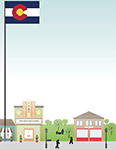Strengthening Colorado’s Communities into the Future
In This Section
Colorado Municipalities
April 2019
By Rick Garcia, Colorado Department of Local Affairs executive director

Moving Boldly Forward — that is the mission I have charted my career on and will continue to do as the new executive director of the Colorado Department of Local Affairs (DOLA).
Coming to DOLA as a leader for the past 25 years in affordable housing, economic development, and transportation, I will continue to work to strengthen Colorado’s communities.
The governor has charged me with strengthening policies and improving programs, such as housing, business development, transportation, and equitable community development.
I have spent the majority of my public service career working toward a stronger, more efficient economy in Colorado.
Gov. Jared Polis has four strong and direct initiatives that DOLA will fold into its strategic goals moving forward. The initiatives focus on providing every child with quality
early education; lowering the cost of health care; creating better-paying jobs in the clean-energy sector that cannot be outsourced; and reducing taxes for Coloradans instead of giving breaks to special interests. These initiatives are bold, and it is DOLA’s goal to set aside discretionary funds that go toward these priorities.
The great thing about DOLA is that it is able to impact every part of Colorado, from the Eastern Plains to the northwest corner to the Western Slope and all the way to the southeastern corner of the state. The impacts can vary from drought and climate change to looking at the population shifts in places that never thought they would see the development or sizeable reduction within recent years. The state’s increased population has required us to be creative with how we deal with population expansion in smaller communities, and DOLA has and will continue to address the changes to Colorado.
In addition to focusing on population change, DOLA will focus a large portion of its efforts on Census 2020. Being the lead agency for this decennial count, the department prides itself on getting an accurate and complete count for Colorado. DOLA, in partnership with the Colorado Complete Count Committee, additional sister agencies, and other nonprofits, will ensure that there are strategic outreach efforts in place that identify and ensure that hard-to-count populations are not missed, as well as focusing efforts on rural communities to make sure everyone counts in Colorado.
DOLA will center attention in the rural communities, as we have seen a substantial change in housing needs outside of the Denver-metro area and Front Range Colorado. More than 30 percent of households in Colorado are housing-cost burdened. This means that we need to address the cost of sustainable, safe, and affordable housing. The Division of Housing has focused efforts on providing residents with safe and stable housing and, as of last year, provided 3,181 affordable housing opportunities for Coloradans.
But DOLA should and wants to do more with this. The department has the opportunity to serve people with disabilities, which leads to the launch of the new Home Modification Tax Credit Program. The program came out in January, to aggressively tackle this problem and provide help and alleviate tax burden to those families, by providing up to a $5,000 tax credit for people who have made modifications to their homes based on a disability, impairment, or illness. This type of advanced thinking will allow DOLA to progressively and effectively meet the needs of Coloradans. We have an obligation to the residents of Colorado to address needs that include the promotion of economic health, development, and sustainable living through the increased accessibility of affordable housing and supportive services through a strategic rollout that will include growing programs that work with families in need.
DOLA will continue to collaborate with communities across Colorado to
tackle some of the issues that have been identified as essential. This will include working with the Colorado Resilience Office (CRO) to position it as a statewide resource for recovery and planning through the creation of long-term funding initiatives.
Planning is not the only concern. DOLA recognizes that it needs to establish a stronger partnership with the Office of Economic Development and International Trade, Colorado Energy Office, Colorado Department of Natural Resources, and Colorado Department of Transportation to develop criteria that allows for these state agencies to work together to fund and support the clean-energy sector and rural development projects.
I look forward to being able to collaborate with all of our communities, specifically the rural areas, to work with them on housing, building capacity through strategic planning, and overall strengthening of their communities during my tenure.
There has been an ongoing conversation about education and equal education for all. You may ask, “How does education align with funding from DOLA?” The department will look at ways to align its funding opportunities where there is need, with the development of infrastructure that will enable early childhood education workforce. What does that mean? It is simple: If there is a need in a community to develop a center for early childhood education that would
in turn provide jobs in the educational workforce and provide a balance for local asset-building activities, DOLA can look at funding. DOLA’s goal is to continue to promote sustainable community development and increase livability throughout Colorado, and early childhood education can be a contributor.
Finally, with growth comes a need for change and development. There has been an increased need for the expansion of broadband internet service to achieve economic development and interjurisdictional communication, mainly in rural Colorado. Through DOLA’s planning for the “middle mile” infrastructure grants, you will start to see additional support for rural communities in Colorado that will create access to broadband infrastructure in locations not currently achieving the “middle mile” goal. Regional broadband plans have already been developed, and it is DOLA’s goal to ensure that the phased approach to planning and implementation of broadband occurs statewide. It is my view that creating opportunities for distance learning, new businesses, and telemedicine is imperative for the success of rural Colorado. It is my goal to provide this foundational need for Colorado, and with the partnerships we will develop and the momentum we have, success will grow.
I look forward to the work, challenges, and opportunities ahead.
